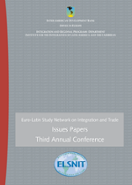Euro-Latin Study Network on Integration and Trade (ELSNIT): 3rd Annual Conference
Date
Sep 2006
EDITOR
Inter-American Development Bank (IDB)
The process of economic reform and trade liberalization in Latin America and the Caribbean, under way since the end of the 1980s, has brought about an increasing integration of the countries in the region into the world economy, both in terms of commercial and investment flows. At the same time, Latin American countries have been pursuing the process of deepening economic integration at the subregional level, negotiating trade liberalization at the regional and hemispheric level, as well as engaging in multilateral trade negotiations. Latin American countries are also negotiating cooperation and free trade agreements with other countries and regions of the world, both developing and industrial ones. These developments, as well the emergence of new powerful players on the international arena, such as China and India, represent opportunities but also enormous challenges for Latin America. In facing these challenges, the countries of Latin America and the Caribbean are open to ideas, experiences and good practices that may contribute to their successful integration into an increasingly open and competitive international economy. In this regard, the rich European experience in the process of regional integration over the last decades that has brought about not only mutual trade liberalization, but also the establishment of joint institutions, a common currency as well as political cooperation and a strong component of solidarity among member countries could be of benefit for the region. Moreover, Latin America is an important market for the European Union as it positions itself in global competition and seeks partners for economic as well as political cooperation. With this in mind, in 2002, the Inter-American Development Bank, through the Special Office in Europe and the Integration and Regional Programs Department, through the Institute for the Integration of Latin America and the Caribbean (INTAL), launched the Euro-Latin Study Network on Integration and Trade (ELSNIT). The Network operates with the collaboration of partner European centers, leaders in research in the area of integration and trade. ELSNIT represents a platform for an exchange of ideas between European and Latin American experts, and ultimately a source of support for policy makers on both sides of the Atlantic. This publication provides an account of the main findings of the second cycle of activities of the Network during 2005/2006.



